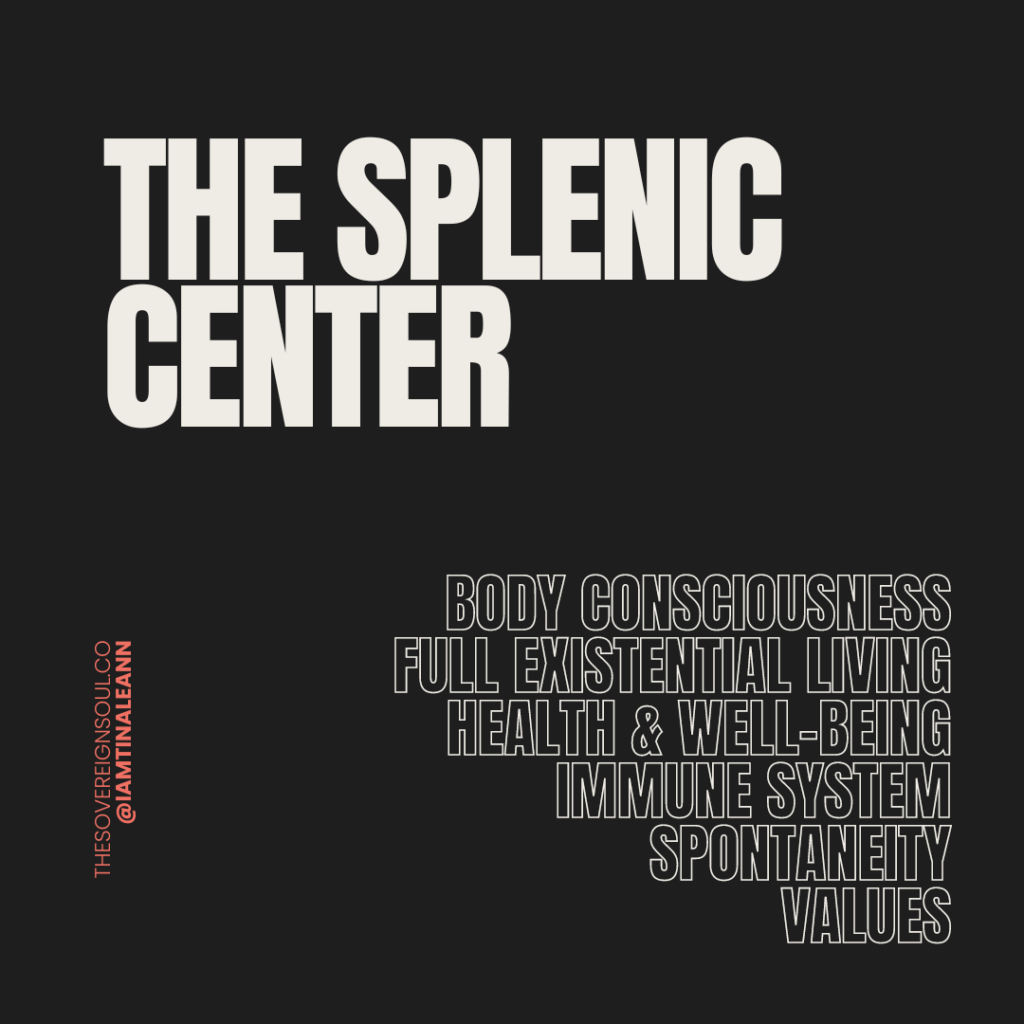Let’s talk about the Splenic Center, the oldest of three awareness centers (along with the Ajna and the Emotional Solar Plexus), which is responsible for surviving and thriving. Its job is to keep us alive, and this is where fear lies.
(It’s also where intuitive health and well-being lie, but we’ll save that for a another time).
The Splenic Center manages our instincts and intuition in the present moment with a subtle internal nudge and does not repeat itself. It’s that inner knowing, gut feeling, goosebumps, or quiet whisper.
Defined Splenic Center (colored in)
Those with a defined Splenic Center as their Authority must listen to intuition (their gut instinct) and do what it tells them to do without allowing anything to distract them—this includes the not-self, family, friends, the mind, societal pressures, external messaging, etc.
Following intuitive hits requires deep faith and reaps deep rewards. The more you follow your instincts and intuition, the happier you’ll be, the stronger your immune system will be, and you’ll project a great sense of well-being that’s envied by those with an undefined Splenic Center who do not consistently feel good.
The mind is loud, but it’s not the Authority. Living fully present in the moment through the body’s intelligence will ultimately result in heart coherence.
Undefined Splenic Center (white)
The Spleen holds seven primal fears, which are magnified when undefined. You must face each of your fears one at a time to become fearless in a healthy way. Each time you face a fear, you’ll feel stronger and stronger, will build awareness and confidence, and will learn to trust in your own strength and courage in taking care of yourself.
Those born with an undefined Splenic Center will unconsciously be drawn to those with a defined Splenic Center to feel safe and secure. Which can be healthy, but be aware that there is a negative side to this. No matter how toxic, those with an undefined Splenic Center (when in the not-self) can hold on too long, leading to unhealthy relationship dependencies.
Children will do everything they can to hold on to an abusive parent to access the ‘feel good’ feeling of the defined Splenic Center.
Adults with an undefined Splenic Center experience a deceptive sense of security when in partnership with a defined Splenic Center. When in the not-self, they’ll stay in a relationship with a defined Splenic Center even when it’s no longer healthy for them instead of facing their deep fears of survival with an internal dialogue that sounds like, “It’ll be better tomorrow.” “We’re working through things.” “What about the children?” “Others have it much worse.” “I should be grateful for the good things in my life.”
Deconditioning looks like following your Strategy and Authority. Be aware that it can take some time to come back to the body to feel your impulses, trust your intuition, rewire your brain, recalibrate your nervous system, and build a new habit. Start slowly; each day, pay close attention to your gut instincts and what those nudges feel like in your body.
And each time you follow a nudge, you’ll gain more trust, an empowered knowing that you CAN take care of yourself, and a deeper sense of Self. It gets easier and easier to face your fears as you let go of things that are no longer aligned while saying yes to things that bring you joy.
As you gain a healthy orientation to your undefined Splenic Center and can discern between your own needs and the needs of others without taking on unhealthy vibrations, you’ll become a great healer as you intuitively know what’s out of balance in another.
Gates of the Splenic Center
Gate 48: The Well, The Gate of Wisdom: The Fear of Inadequacy. Fear that you aren’t enough or don’t know enough, for example—imposter syndrome.
Gate 57: The Gentle, Instinct, The Gate of Inuitive Clarity: The Fear of Failure. Fear of what the future will bring, so you hold back.
Gate 44: Coming to Meet, Truth, The Gate of Alertness: Fear of the Past. Fear that past baggage will catch up with you. Fear of moving forward because you’re afraid the patterns of the past will repeat themselves. You may feel stuck.
Gate 50: The Cauldron, Nurturing, The Gate of Values: Fear of taking on responsibility or, on the other end of the spectrum, taking on too much responsibility due to fear: for example, putting value on what you DO instead of who you BE—people pleasing.
Gate 32: Duration, Endurance, The Gate of Continuity: Fear of Failure, which (as you know) can hold you back from doing great work in the world.
Gate 28: Preponderance of the Great, Adventure/Challenge, The Gate of the Game Player: Fear of Death/Purpose. Fear that life has no purpose unless you take risks.
Gate 18: Re-Alignment, The Gate of Correction: Fear of Authority. Fear of being judged by others and/or too much self-judgment.
Fear (or lack thereof) will show up unique to you and is multilayered based on your bodygraph.







